The menopause usually affects women between the ages of 45 and 55. It is a natural process during which menstrual periods become irregular and eventually disappear altogether. This process is also sometimes referred to as the “change of life”.

Menopausal Disorders
Treatments
- All treatments
- Prescription medicines
- Non-prescription medicines
- Relevance
- Name A-Z
- Name Z-A
- Price low-high
- Price high-low

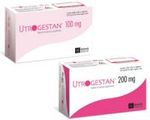
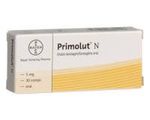
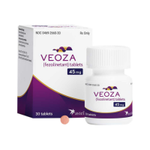
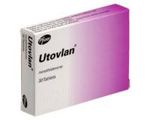
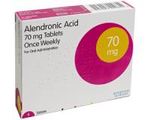
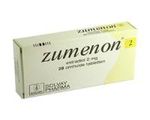

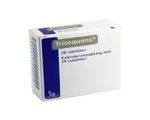
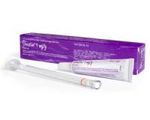

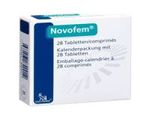
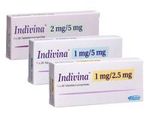
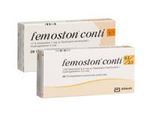
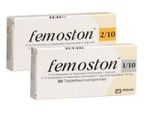
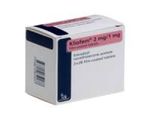
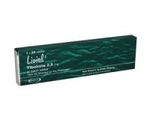
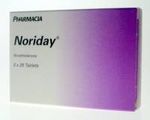
How does Dokteronline work?
At Dokteronline, you can get expert advice from doctors quickly, without the hassle of visiting your GP’s surgery. Take care of your health with reliable treatments and information from the comfort of your home.
Select your preferred treatment
The doctor will review your medical request
The pharmacy will ensure your medication is delivered to your doorstep
What is the menopause?
In women aged between 45 and 55, activity in the ovaries gradually decreases because their supply of fertile eggs starts to run out. Once no more eggs are released, their production of the female hormone oestrogen also decreases. As a result, their periods become irregular and eventually stop altogether. On average, this whole process lasts about four years. When her menstruation stops completely, a woman is said to have reached menopause.
The shortage of oestrogen in her body causes symptoms such as hot flushes, bouts of sweating, difficulty sleeping, mood swings and palpitations. The mucous membrane in the vagina becomes drier, too, which make her more prone to vaginal infections. Menopausal symptoms can also occur if the ovaries have been surgically removed or when taking certain medications. Women who have undergone radiotherapy or chemotherapy may go through the menopause earlier. The same applies to women who smoke.
What causes the menopause?
When a girl reaches puberty, her female sex hormones become active. They trigger her first monthly periods. Various hormones, the brain and the ovaries play a role in this process. During the years a woman is fertile, her ovaries produce the hormones oestrogen and progesterone. These are responsible for maturing an egg in the ovary, for its release into the womb (ovulation) and for forming the endometrium (thickened womb lining). Ovulation occurs once a month, and if the egg released then is fertilised it can implant itself in the endometrium and develop into a foetus. If this does not happen, the endometrium breaks down two weeks after ovulation and is discharged through the vagina. This is the female period. From about 40 years of age onwards, the supply of eggs in the ovaries is depleted. Because they are no longer released regularly each month, oestrogen production decreases. The endometrium becomes drier, menstruation becomes irregular and less frequent, and after a few years it stops altogether. Many women suffer hot flushes during this process, although it is not entirely clear what causes them.
Certain medical disorders, such as the rare autoimmune condition Addison’s disease, can cause the menopause to occur prematurely – that is, before the age of 40. So too can chemotherapy, radiotherapy or ovarian surgery. In many cases, though, the cause of premature menopause is unclear.
What happens during the menopause?
Although the whole “change of life” described above is commonly called “the menopause”, medical professionals use different terms to describe its different phases. If you start suffering symptoms like hot flushes before your periods stop, that is known as “perimenopause”. This is also when your periods are likely to become irregular. Menopause proper begins only once you have stopped menstruating altogether. Medically, it is diagnosed when you have not had a period for twelve months. At this point your reproductive system is no longer functioning.
How do you recognise the menopause?
Most women who are menopausal notice the following symptoms.
- Irregular periods.
- Hot flushes.
- Vaginal complaints, such as dryness.
- Dry skin.
- Dry mouth and eyes.
- Itching and burning when urinating and during sex.
- Reduced sex drive.
- Mood swings.
- Difficulty sleeping.
- Palpitations.
- Urinary tract problems.
- Osteoporosis.
The most recognisable symptoms are irregular periods and hot flushes. Your periods gradually change, most likely becoming less intense and shorter each month. But you may also experience other menstruation-related symptoms you have never had before, such as backache or headaches. Hot flushes are short-lived feelings of intense bodily heat. They can turn your face and chest red and you may experience heavy sweating, often at night. Also, your skin may become drier and less elastic and wrinkles may form. And you might experience dryness of the mouth and eyes due to reduced production of lacrimal fluid (tears) and saliva. As your body is producing less oestrogen, the inside of your vagina becomes thinner and drier, which can lead to itching and burning.
In these circumstances, you may be more prone to infections such as cystitis. Since your body also produces less testosterone, your sex drive may decrease as well. One natural phenomenon of ageing more generally is that your pelvic floor muscles start to weaken, which can cause the bladder to sag (prolapse). And as the mucous membranes of the urinary tract become thinner, you may have difficulty holding in your urine and experience leakage when sneezing, coughing or undertaking day-to-day activities.
Finally, menopausal women are more likely to develop osteoporosis. This is because oestrogen is responsible for effective calcium absorption by the bones, so a fall in its production makes the bones more fragile.
Can I do anything about the menopause myself?
Perimenopause and menopause are completely natural processes, which every woman experiences. If they cause any of the symptoms we have described, you can follow the advice below. When your periods start changing, try to eat healthily and to consume foods rich in iron. Examples include red meats, leafy green vegetables and wholemeal products. Also try to exercise for at least half an hour every day – for example, by cycling, swimming or walking. It is also advisable to take extra vitamin D supplements. This vitamin is important for the growth and upkeep of strong bones and teeth, healthy muscles and a properly functioning immune system. Most of it is obtained from the sun, but in older age your skin has more difficulty converting sunlight into vitamin D.
Make sure you get enough sleep. If you experience hot flushes, wear fabrics that absorb moisture well, such as cotton. Also consider wearing layers, so that you can take one off easily if you suffer a hot flush. Choose sheets and blankets made from natural materials rather than synthetics, as this reduces perspiration. Finally, certain foods and drinks can trigger hot flushes. They include alcohol, spicy dishes and hot beverages, so try to avoid these as well.
What treatments are available?
Women who suffer serious menopausal symptoms may be prescribed a hormone treatment by their GP. This is commonly known as hormone replacement therapy, or HRT. If you are particularly affected by vaginal complaints, you will be given a cream or suppositories containing oestrogen. These are either rubbed or inserted into the vagina to prevent dryness. If you mainly suffer from hot flushes, you may be given oestrogen tablets or plasters. These are similar to the contraceptive pill, but deliver smaller hormone doses. The tablets generally come in strips, each for a 28-day course of treatment. When you finish a strip, you immediately start with the next one, without a pill-free week. As the amount of oestrogen in the body is replenished, your menopausal symptoms should ease. But do note that hormone tablets have side effects and risks. They are therefore not normally used for more than a year or two at a time to treat the symptoms of the menopause.
Possible alternative treatments include acupuncture, but this method has not been scientifically proven.
Risks and side effects of treatment
The most common side effects of hormone tablets used to treat the menopause are…
- Headaches.
- Nausea.
- Sore or tender breasts.
- Fungal infections.
- Depression.
- Migraines.
- Allergic skin reactions.
- Vaginal bleeding or spotting.
- Changes to vaginal discharge.
- Hypersensitivity.
- Fluid retention.
In addition, all women undergoing HRT are at a higher risk of blood clots in the veins (thrombosis). Complaints such as headaches, nausea and sore or tender breasts generally go away on their own, as do vaginal bleeding and increased or decreased vaginal discharge. Hypersensitivity can take the form of skin rashes, itching or hives. Also, your face or throat may swell up and you might feel short of breath – if any of these symptoms occur, see a doctor immediately. Fluid retention causing swollen ankles and feet, for example, is another possible side effect. This is usually accompanied by an increase in body weight and slightly raised blood pressure. Contact your doctor if you suffer from this. He or she will probably reduce your dose of the hormone.
Research has shown that hormone tablets containing oestrogen-progestogen combinations can increase the risk of breast cancer, but only after several years of use. Once the treatment ends, the risk subsides again and is back to normal after five years. As a precaution, always check your breasts regularly and contact your doctor if you notice any changes, such as dimpling of the skin, changes to a nipple or lumps.
How can you prevent menopause?
Since the menopause is a completely natural process, it cannot be prevented. In general, following the advice above should make you feel better. If these tips do not help and you still suffer from hot flushes or other symptoms, HRT may be effective. Many women benefit from it.
Sources
Farmacotherapeutisch kompas. (2019). Oestrogeen met oestrogeenreceptormodulator. Geraadpleegd van https://www.farmacotherapeutischkompas.nl/bladeren/groepsteksten/oestrogeen_met_oestrogeenreceptormodulator
Nederlands Huisartsen Genootschap. (2019). NHG-Standaard De overgang. Geraadpleegd van https://www.nhg.org/standaarden/volledig/nhg-standaard-de-overgang
Nederlands Huisartsen Genootschap. (2018, 1 maart). Ik ben in de overgang. Geraadpleegd van https://www.thuisarts.nl/overgang/ik-ben-in-overgang
Raboud UMC. (2019). Overgang. Geraadpleegd van https://www.radboudumc.nl/patientenzorg/aandoeningen/overgang/wat-is-de-overgang